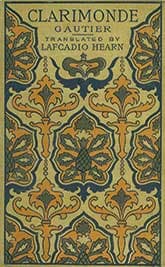Clarimonde
Critique • Quotes
 1899 translation
1899 translationFirst publication
La Chronique de Paris literary review, 1836
Original title
"La Morte Amoureuse"
First English translation
In collection One of Cleopatra's Nights and Other Fantastic Romances, Lafcadio Hearn, 1836
Also known as
"The Dreamlad Bride", "The Dead Leman", "The Vampire"
Literature form
Story
Genres
Fantasy, horror
Writing language
French
Author's country
France
Length
Approx. 13,500 words
Of sensual and spiritual love
Even a reader who is not into horror can get something out of the supernaturally charged writings of Théophile Gautier, especially his story "Clarimonde"—also known in English translation as "The Dreamland Bride", "The Vampire", and other titles from the French "La Morte Amoureuse".
Partly this accessibility derives from the delicious ambiguity of the fantastic elements in "Clarimonde". You don't have to suspend disbelief in the paranormal to enjoy the mysterious story—at least not entirely.
In the beginning it's made clear our protagonist Romuald, a priest by day, lives an aristocratic and wildly hedonistic life by night—in his dreams. The latter is so vivid to him he is sometimes uncertain which is the dream and which is reality.
Throughout the story, his developing life with his vampiric lover Clarimonde (does she really exist? is she alive?) is hedged by the realization most of it takes place when he is asleep or feverishly ill. His experiences may or may not be explained as a mental breakdown, a fulfilment of his wishes for an unfettered life. Or they may be due to possession by an evil spirit as the Church would have it.
At the same time there are indications it's not all hallucination. Clarimonde seems to start as a real being, known to the priesthood as a blood-sucking harlot. She is reported to have died and returned to life several times. After this, her latest death, a priestly colleague dissolves her miraculously preserved body with sprinkles of holy water, after which she says farewell to our still lovesick Romuald.
Most unreliable narrator
In broad strokes, many stories of the supernatural follow this format. A bizarre sequence of events is set up, allowing the likelihood they're all produced by a character's imagination—but then, at the end, an inexplicable phenomenon upsets the mundane explanation, ending the story as an open question.
This is the plot, for example, of another Gautier story, "The Mummy's Foot". A man buys an Egyptian princess's mummified foot in a curiosity shop. At night he has a vision of the princess who wants her foot back in return for an idol she is wearing around her neck. After further adventures through time and space with the princess, he wakes. Apparently it was all a dream. But then he notices his purchased mummy's foot is gone—replaced by the idol!
The ambiguity in "Clarimonde" is more nuanced. The priest is obviously disturbed, the most unreliable of first-person narrators. And adding levels of interpretation to the tale is the religious subtext.
The conjoining of priest and church is often presented as an analogy to earthly marriage, with the priest promising to forebear engaging with any other woman. "Clarimonde" plays this up this parallel. Romuald is intensely aware that when he joins the priesthood he is swearing off sexual love. He is deeply torn about his presumed religious calling. Clarimonde makes her first appearance to him in the flesh (so it appears) at his investiture to draw him away from the Church, and he is tempted. But he goes through the ceremony—like so many novices before him, he notes—out of obligation, so as not to cause a scandal.
Henceforth Romuald's relationship with Clarimonde would be in a world of illusion. His fantasy life with Clarimonde is actually pretty great, a life of nobility and ease and enjoyable recreation and endless lovemaking with the woman he loves. All he needs to do is let her have a little of his blood now and then. Still though, he is haunted by guilt.
In the end, Clarimonde is banished from Romuald's world, but not from his heart. He wins salvation but he finds God's love is not enough to replace that of his dream lover.
The story wraps with what would seem to be an unambiguous warning to his priestly brothers: never gaze upon a woman and always stay chaste, as one mistake could win eternal damnation.
Yet, a tiny suspicion remains that the author Gautier might be winking at this bit of religious hyperbole. What is he really saying and what are we really to take from this story?
— Eric
Critique • Quotes

